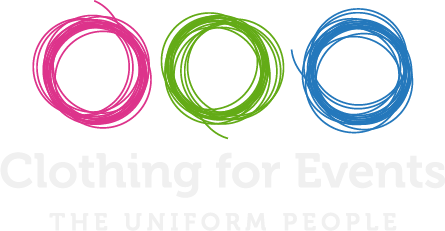Sustainable workwear trends

The process of making conventional cotton clothing is thirsty work. It can take 2,700 litres of water to grow and manufacture a single cotton t-shirt. Times that amount by the number of cotton t-shirts, cotton hoodies, polo shirts and other clothing apparel produced globally and it’s easy to see how water-rich crops contribute to water shortages. The pesticides used in producing conventional cotton farming also makes the water unsuitable for anything else.
Organic cotton farming is a more positive and sustainable alternative. Through practices such as crop rotation, composting, rainwater harvesting and pest management, organic cotton has less impact on the environment by using 88% less water and 62% less energy. Organic farming methods also benefit the wider ecological system and keep farmers and their families safe by not exposing them to toxic chemicals in their food and water supply.
As an ethical clothing UK supplier, Clothing for Events works with a select number of certified sustainable clothing and accessory companies to produce organic cotton workwear, sustainable uniforms and other clothing suitable for companies and events of every size. In following the supply chain to source, these eco-friendly and vegan clothing manufacturers create products that respect people, the environment and customers. Products that look good, feel great and that your staff and customers will be proud to wear.
Clothing for Events are the official UK suppliers of ethical clothing brands including:
Stanley/Stella
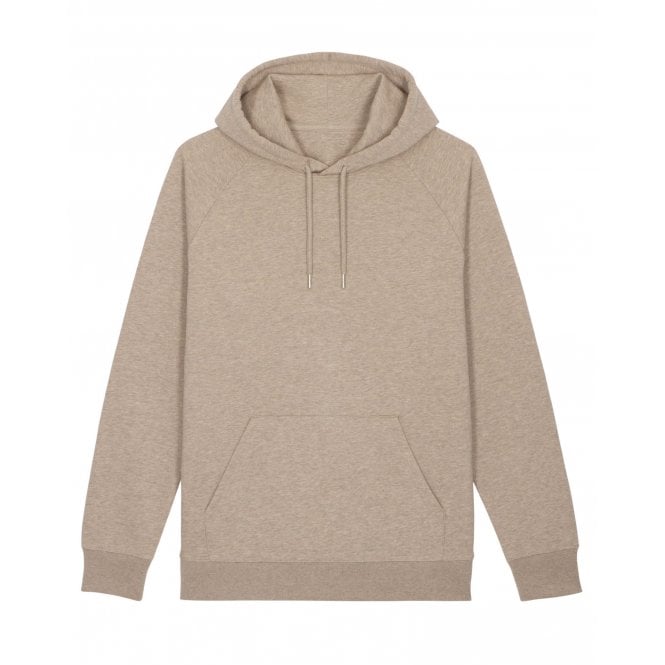
Authentic, responsible clothing suitable for branded uniforms made in a humane, ethical and ecological way.
Neutral
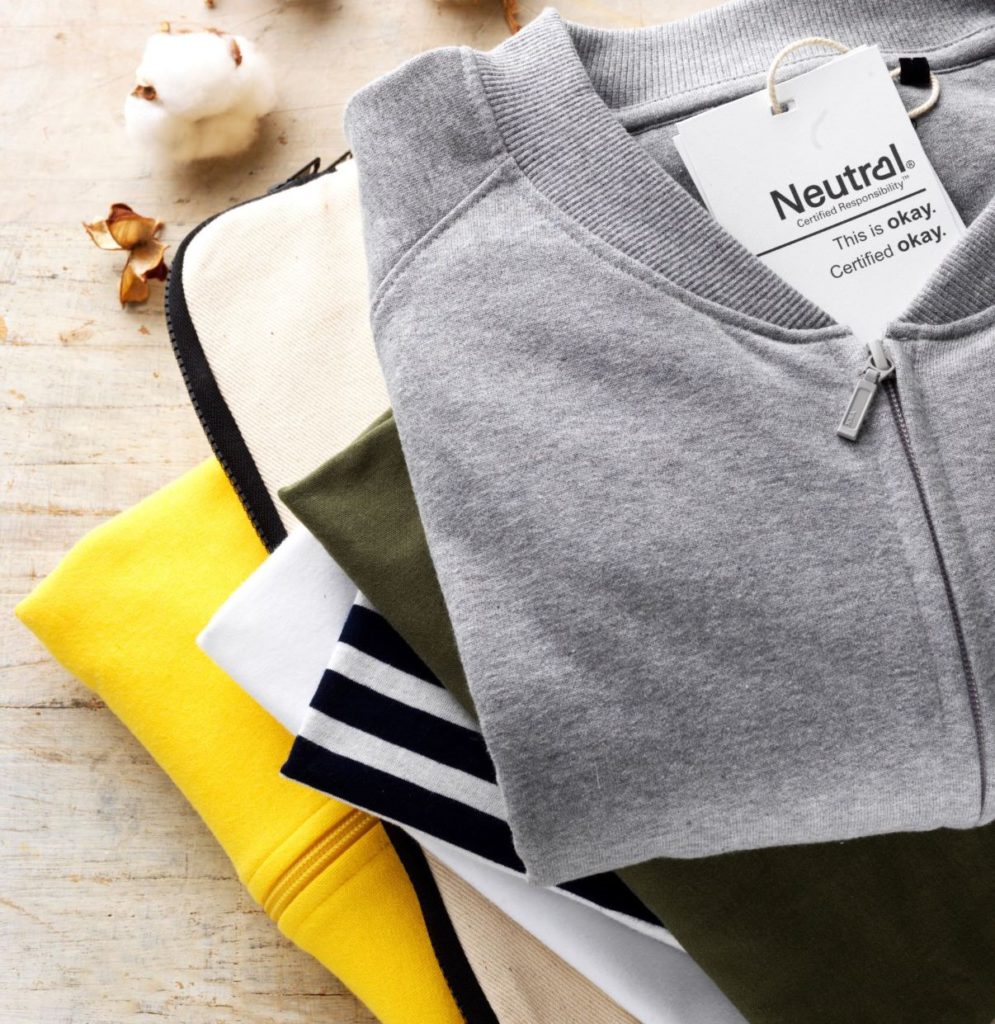
Clothing made from organic raw materials to environmentally friendly and socially responsible methods.
Bella + Canvas

Eco-manufacturer of premium wholesale apparel that uses 7 x less water than average clothing manufacturers.
Recycled polyester
Polyester textile recycling often uses old plastic bottles made of polyethylene terephthalate (PET), a source of plastic that would otherwise go into landfill. Lots of recycled uniforms and other clothing can be made from PET plastic bottles, from polyester aprons, polos and ethical hoodies to work fleece jackets. Our Stanley/Stella ethical clothing range uses recycled polyester derived from 7-8 PET plastic bottles in its windcheater jackets. Recycled polyester can also be combined with organic cotton to create a fabric that’s ultra soft on the skin.
Curious as to how a plastic bottle can transform into fabric?
Step 1: The bottle is collected and cleaned at a sorting facility
Step 2: It’s then crushed into small plastic flakes
Step 3: These flakes are melted into pellets the size of tic tacs
Step 4: The pellets are melted again, extruded and spun into thread
Step 5: This thread is dyed before being woven into fabric
Clothing for Events are the official UK supplier for brands using recycled polyester, including:
Parkland uses recycled water bottles to create bags that combine purpose, style and quality.
Elevate Nxt follows the supply chain to source to create ethical apparel made from recycled polyester and organic cotton.
Eco-friendly merchandise
When it comes to promoting your business or event, sustainable merchandise can be a good way to demonstrate the environmental credentials of your brand and stand out. Our eco-friendly, sustainable, recycled and biodegradable range include:
Bamboo cups: Bamboo cups are made from naturally sustainable bamboo fibre combined with corn starch to form a paste which is then mixed with a resin.
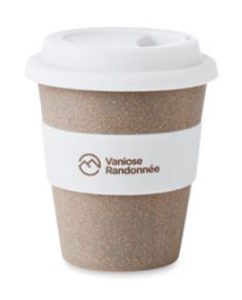
Recycled paper notepads: Paper use is one of the greatest causes of deforestation. Our wide range of recycled paper notepads are made from paper reconstituted into paper again.
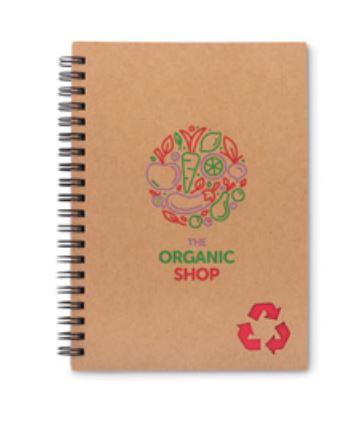
Sustainable water bottles: Nothing says waste more than a single-use plastic bottle. Reusable water bottles made from sustainable materials such as bamboo and stainless steel help you send out a strong brand message that you care about the environment.
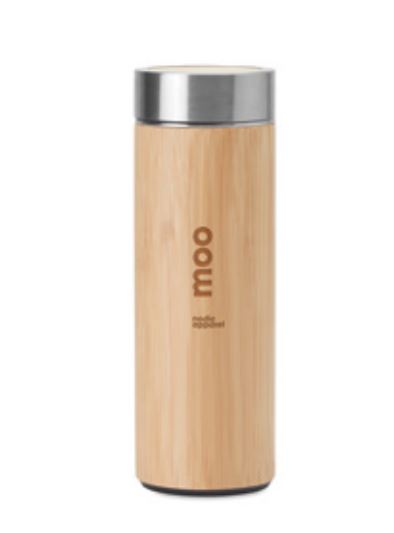
Sustainable textile printing
Sustainable t-shirt printing and workwear embroidery help your company go a step further in caring for the environment and reducing textile waste. There are various methods available when branding recycled corporate uniforms and workwear, including water-based screen printing, which avoids the use of plastics to recycled polyester thread and organic cotton embroidery thread made to GOTS standards.
Greener and more sustainable than Plastisol (plastic) inks, high quality waterbased inks offer rich, colourfast printing with no sign of cracking or peeling over time. Onsite printing enables us to lower the carbon footprint attached to outsourcing.
Buying workwear to last
Buying well made, long lasting workwear is vital to supporting a company’s sustainability initiatives. It also has image, cost, safety and even productivity implications. Poorly made clothing often looks cheap, which can easily undermine brand image. Cheap clothing also often needs replacing often, which can rack up workwear costs. Badly made and ill-fitting clothing, especially safetywear, may also not be fit for purpose, which can affect wearer comfort, productivity, and ultimately be a health and safety concern.
Buying well in the first place is the best way to protect your company’s brand image, safety and wellbeing, productivity of employees and the company’s uniform budget.
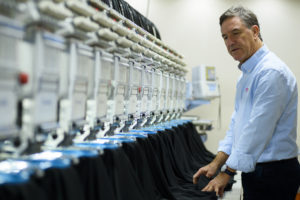
Finding the right supplier
Working with a clothing supplier whose values align with yours will ensure you get the best products, at the best price. At Clothing for Events we’re doing everything we can to help boost our customers sustainability initiatives and to help them keep up with evolving trends. Beyond working with the very best ethical clothing brands, we’re also working hard internally to be more sustainable, by reducing energy use, waste and packaging. Some of the ways we’re making a difference include:
Energy use
Solar panels enable us to power our business with renewable energy. Any excess goes into the national grid. Our office and warehouses use solar-generated LED lighting. Energy efficient glazing and wall insulation also helps us lower our carbon footprint.
Carbon footprint
We help reduce global emissions by favouring sea freight over air freight. Our aim is to become carbon neutral by 2030. Managing much of our print and embroidery onsite also enables us to reduce our carbon footprint, while ensuring greater quality control. In 2020, we were awarded the Carbon Footprint Standard for offsetting 19.776 of carbon dioxide.
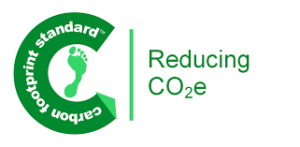
Packaging
We make every effort to package responsibly, with up to 90% of our packaging and shipping materials recyclable. Packaging waste within our ISO 14000 certified warehouse goes to recycling, not landfill, further helping us to keep waste down.
Waste
At Clothing for Events we reuse and recycle everything we can, including end of life uniforms. Over 90% of our waste by volume is recycled. This amounted to over 1.5 tonnes in 2019 alone.
All waste is taken to our own waste transfer station in Ascot. Here the waste is tipped, sorted through and separated into plastics, cardboard etc. Once separated it is converted into something new. Rather than dispose of textile waste we recycle old work uniforms by shredding them down for use as fuel or as wadding for dog beds that local animal shelters can use. Plain, unbranded items go to
Christian Eye, a charity helping children and families in need in Africa. General, non-hazardous waste which cannot be recycled, is sent to an ERF waste treatment facility for converting into energy.
The Future
Where an item is made, how it’s manufactured and the way it’s transported all play a role in sustainability. Whether you want the best ethical t-shirt suppliers, a recycled polyester apron, organic cotton sweatshirts or other organic workwear, we make it easy for clients to make the right sustainable choices with clothing and products by manufacturers that combine ethics with style and quality at an accessible price.
This is supported by inhouse uniform design advice and sustainable brand printing powered by our own renewable energy supply.
Contact us to discuss our stylish and affordable ethical clothing range.
